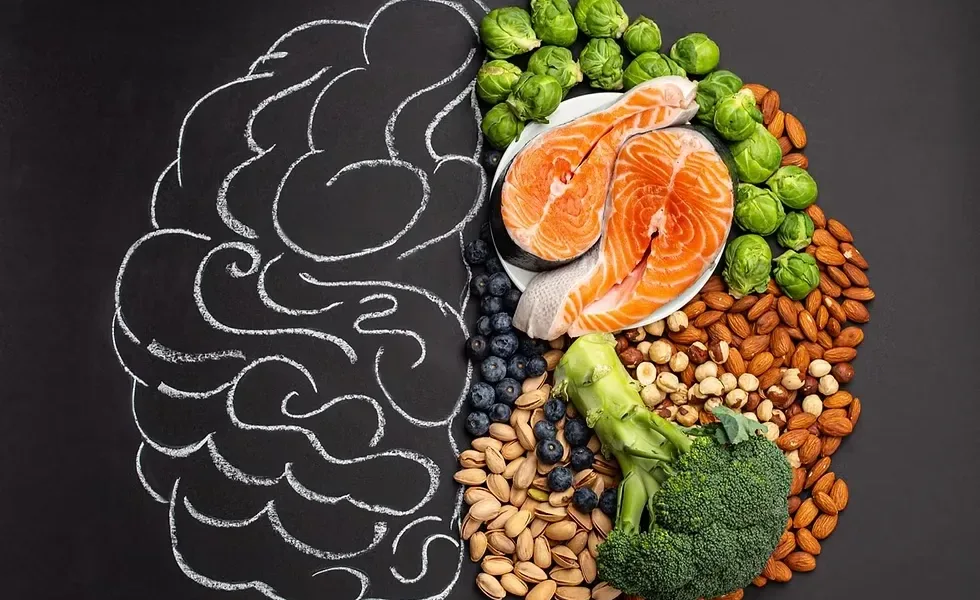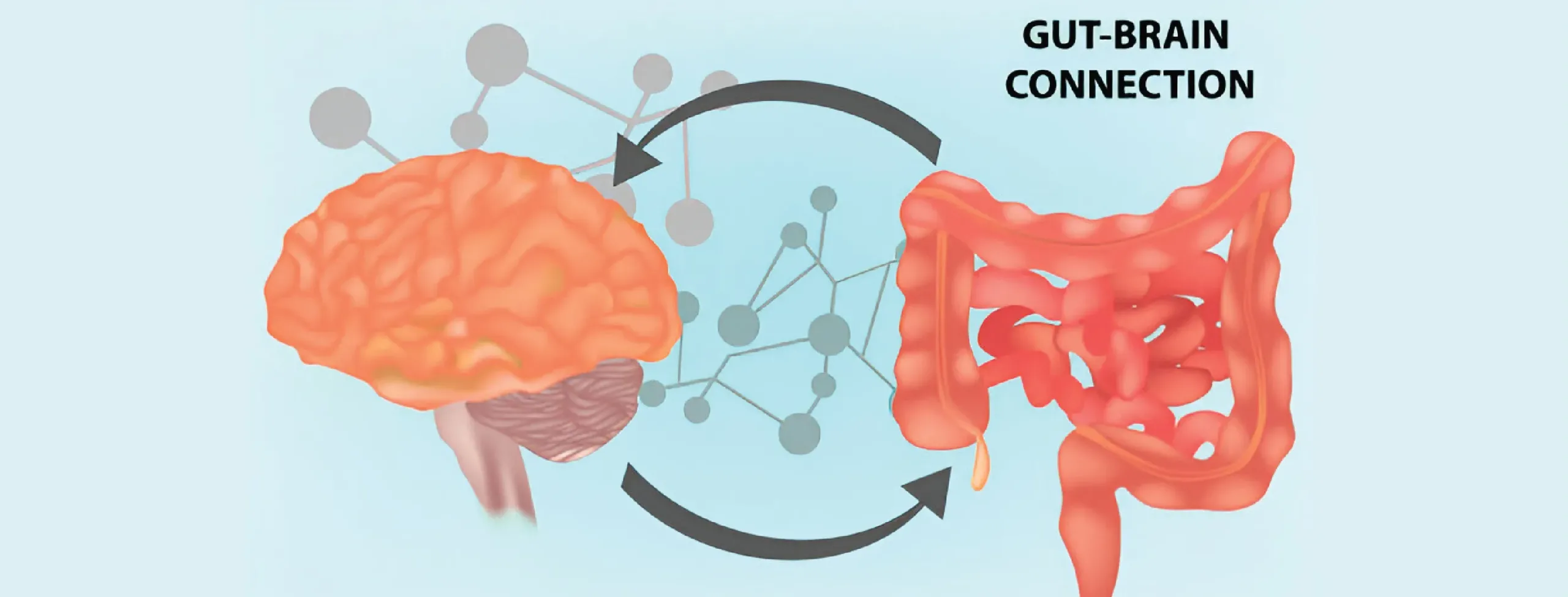The Link Between Gut Health and Mental Health
In recent years, science has increasingly uncovered a fascinating and complex relationship between our gut and our brain. What we eat, how our digestive system functions, and the balance of bacteria in our intestines can all influence our mood, stress levels, and even our risk for mental health conditions like anxiety and depression. This connection, often referred to as the gut-brain axis, highlights the powerful interplay between physical health and emotional well-being.
In recent years, science has increasingly uncovered a fascinating and complex relationship between our gut and our brain. What we eat, how our digestive system functions, and the balance of bacteria in our intestines can all influence our mood, stress levels, and even our risk for mental health conditions like anxiety and depression. This connection, often referred to as the gut-brain axis, highlights the powerful interplay between physical health and emotional well-being.
Understanding this connection is not only academically interesting but also offers practical strategies for improving both digestive and mental health simultaneously. In this article, we’ll explore the science behind the gut-brain axis, how gut health affects mental health, the signs of an unhealthy gut, and actionable steps you can take to nurture both.
Table of contents
- Understanding the Gut-Brain Axis
- How Gut Health Affects Mental Health
- Signs of an Unhealthy Gut
- Foods That Promote Gut and Mental Health
- Lifestyle Practices to Improve Gut and Mental Health
- The Role of Probiotics and Prebiotics
- Gut Health and Specific Mental Health Conditions
- Practical Tips for Improving Gut and Mental Health
- Emerging Research and Future Directions
- Conclusion
Understanding the Gut-Brain Axis
The gut-brain axis is the term used to describe the communication network linking your gastrointestinal tract and your brain. This network is bidirectional, meaning the gut can influence brain function, and the brain can affect gut function.
Three major pathways connect the gut and brain:
- Neural Pathways: The vagus nerve, one of the longest nerves in the body, transmits signals from the gut to the brain and vice versa.
- Immune System: The gut houses around 70% of the body’s immune cells. Immune responses in the gut can trigger inflammation, which has been linked to mood disorders.
- Microbiota Metabolites: The trillions of bacteria in our intestines produce neurotransmitters and short-chain fatty acids that can affect mood and cognition.
This intricate system demonstrates that gut health and mental health are more intertwined than we previously thought.
How Gut Health Affects Mental Health
Several mechanisms explain how gut health influences mental health:
1. Production of Neurotransmitters
Gut bacteria play a crucial role in producing neurotransmitters—chemical messengers that regulate mood, emotion, and cognitive function. For instance:
- Serotonin: Often called the “happiness hormone,” about 90% of serotonin is produced in the gut.
- GABA (Gamma-Aminobutyric Acid): This neurotransmitter helps reduce anxiety and promote relaxation. Certain gut bacteria can increase GABA production.
- Dopamine: Linked to motivation and reward, dopamine synthesis can also be influenced by gut microbiota.
A disrupted gut microbiome can therefore lead to imbalances in these neurotransmitters, contributing to anxiety, depression, and mood swings.
2. Inflammation and Mental Health
Chronic inflammation in the gut can release cytokines—signaling molecules that affect brain function. High levels of these inflammatory markers are often observed in people with depression, bipolar disorder, and other mental health conditions. Maintaining a balanced gut microbiome may help reduce systemic inflammation and promote emotional stability.
3. Stress Response
The gut-brain axis influences the hypothalamic-pituitary-adrenal (HPA) axis, which regulates the body’s stress response. An unhealthy gut can make the HPA axis more reactive, leading to exaggerated stress responses. Conversely, a healthy gut can help buffer stress and improve resilience.
4. Cognitive Function
Emerging research suggests that gut health can also affect cognitive performance. Dysbiosis, an imbalance of gut bacteria, has been linked to brain fog, poor memory, and decreased mental clarity.
Signs of an Unhealthy Gut
Recognizing the signs of gut imbalance can help you address potential issues before they affect your mental health. Common indicators include:
- Digestive issues like bloating, constipation, diarrhea, or gas.
- Frequent mood swings or unexplained anxiety.
- Brain fog or difficulty concentrating.
- Fatigue or low energy.
- Food sensitivities or intolerances.
- Skin issues, such as eczema or acne.
If these symptoms persist, it’s advisable to consult a healthcare professional or registered dietitian.
Foods That Promote Gut and Mental Health
Nutrition plays a crucial role in maintaining a healthy gut microbiome. Certain foods not only support digestion but also boost mood and cognitive function:
1. Fermented Foods
Fermented foods are rich in probiotics, beneficial bacteria that help maintain microbial balance. Examples include:
- Yogurt
- Kefir
- Sauerkraut
- Kimchi
- Miso
These foods can improve digestion, enhance immune function, and even support neurotransmitter production.
2. High-Fiber Foods
Dietary fiber acts as fuel for beneficial gut bacteria, promoting a healthy microbiome. Foods high in fiber include:
- Whole grains like oats and quinoa
- Beans and lentils
- Fruits like apples, pears, and berries
- Vegetables like broccoli, carrots, and leafy greens
Fiber also produces short-chain fatty acids in the gut, which have anti-inflammatory properties and may protect brain health.
3. Omega-3 Fatty Acids
Omega-3s are essential fats that reduce inflammation and support brain function. Sources include:
- Fatty fish like salmon, mackerel, and sardines
- Flaxseeds and chia seeds
- Walnuts
Studies show that omega-3 supplementation can help reduce symptoms of depression and anxiety.
4. Polyphenol-Rich Foods
Polyphenols act as antioxidants, reducing oxidative stress in the body and supporting beneficial gut bacteria. Examples:
- Berries, grapes, and cherries
- Dark chocolate
- Green tea
- Olive oil
These foods can positively impact both gut microbiota composition and mental health.
Lifestyle Practices to Improve Gut and Mental Health
Besides diet, lifestyle choices significantly affect the gut-brain connection. Here are some practices to consider:
1. Exercise
Regular physical activity supports gut microbial diversity and improves mood by releasing endorphins. Even moderate daily movement like walking, yoga, or cycling can have beneficial effects.
2. Stress Management
Chronic stress negatively impacts the gut microbiome. Mindfulness practices, meditation, deep-breathing exercises, and journaling can help regulate stress and improve gut health.
3. Adequate Sleep
Sleep deprivation disrupts gut microbiota balance and can worsen mental health symptoms. Aim for 7–9 hours of quality sleep per night.
4. Avoiding Harmful Substances
Excessive alcohol, processed foods, and unnecessary antibiotics can disrupt gut health. Minimizing these factors can help maintain a balanced microbiome.
5. Hydration
Proper hydration is essential for digestive health. Water supports nutrient absorption and maintains the mucosal lining of the intestines.
The Role of Probiotics and Prebiotics
Supplementation with probiotics (live beneficial bacteria) and prebiotics (food for these bacteria) is increasingly studied for mental health benefits.
- Probiotics: Strains like Lactobacillus and Bifidobacterium have been linked to reduced anxiety and depressive symptoms.
- Prebiotics: Compounds like inulin and fructooligosaccharides (found in garlic, onions, and bananas) nourish gut bacteria, indirectly supporting mood regulation.
While supplements can help, obtaining nutrients from whole foods is generally more sustainable and effective.
Gut Health and Specific Mental Health Conditions
1. Depression
Research indicates that individuals with depression often have reduced diversity in gut bacteria. Certain probiotic interventions have shown promise in improving depressive symptoms, though they are not a substitute for conventional treatments.
2. Anxiety
Anxiety disorders may be influenced by gut microbiota through neurotransmitter regulation and inflammation. Consuming gut-friendly foods and managing stress can support anxiety management.
3. Autism Spectrum Disorders
Emerging studies suggest a connection between gut microbiota and behavioral symptoms in individuals with autism. While research is ongoing, interventions targeting gut health may have complementary benefits.
4. Cognitive Decline
Gut health may impact the risk of neurodegenerative conditions like Alzheimer’s and Parkinson’s disease. A diet rich in fiber, antioxidants, and anti-inflammatory nutrients can support both gut and brain health over time.
Practical Tips for Improving Gut and Mental Health

- Include fermented foods in daily meals.
- Eat a diverse, fiber-rich diet to nourish gut bacteria.
- Manage stress through mindfulness, yoga, or meditation.
- Exercise regularly, even for 20–30 minutes a day.
- Prioritize sleep and establish a consistent sleep schedule.
- Limit processed foods, excessive sugar, and alcohol.
- Stay hydrated throughout the day.
- Consider probiotics or prebiotics if needed, under professional guidance.
- Listen to your body—digestive discomfort may signal the need for dietary changes.
- Maintain a balanced lifestyle, including social connections, outdoor activities, and mental relaxation.
Emerging Research and Future Directions
The field of psychobiotics—probiotics and prebiotics that affect mental health—is rapidly expanding. Researchers are investigating personalized microbiome interventions, fecal microbiota transplants, and novel dietary strategies to optimize mental well-being.
While more studies are needed to establish precise treatment protocols, the growing evidence highlights the importance of a holistic approach to health that considers both the mind and the gut.
Conclusion
The connection between gut health and mental health is undeniable. From neurotransmitter production to inflammation control, the gut plays a central role in regulating mood, stress responses, and cognitive function.
By prioritizing a balanced diet, regular exercise, stress management, and proper sleep, we can nurture both our gut and our mental well-being. Small changes, like incorporating fermented foods, adding more fiber, and practicing mindfulness, can make a significant difference over time.
Understanding and caring for our gut is not just about digestion—it’s about building a resilient mind, enhancing emotional health, and achieving a more balanced, vibrant life. As science continues to unravel the gut-brain connection, one thing is clear: the path to mental wellness starts from within.
Healing the Mind by Caring for the Body
Your emotional well-being isn’t just shaped by thoughts—it’s also deeply influenced by lifestyle, stress levels, and physical balance. These insightful reads explore how mindfulness, stress management, and healthy routines support both body and mind:
• Mindfulness for Better Sleep: Techniques, Benefits, and Science — Discover how rest and recovery impact emotional stability, brain function, and overall mental health.
• Mindfulness in Post-Workout Recovery: The Secret to Healing, Balance, and Growth — Learn how mindful movement and recovery practices improve hormonal balance, mental clarity, and resilience.
• How Meditation Can Help You Manage Stress and Anxiety — Explore how stress-relieving meditation techniques restore emotional harmony and support better physical health.
Looking for Gentle Motivation and Inner Peace?
Explore Positive Mental Attitude — Uplifting quotes to help you stay calm, balanced, and mentally strong.
The Positivity Collective
The Positivity Collective is a dedicated group of curators and seekers committed to the art of evidence-based optimism. We believe that perspective is a skill, and our mission is to filter through the noise to bring you the most empowering wisdom for a vibrant life. While we are not clinical professionals, we are lifelong students of human growth, devoted to building this sanctuary for the world.
